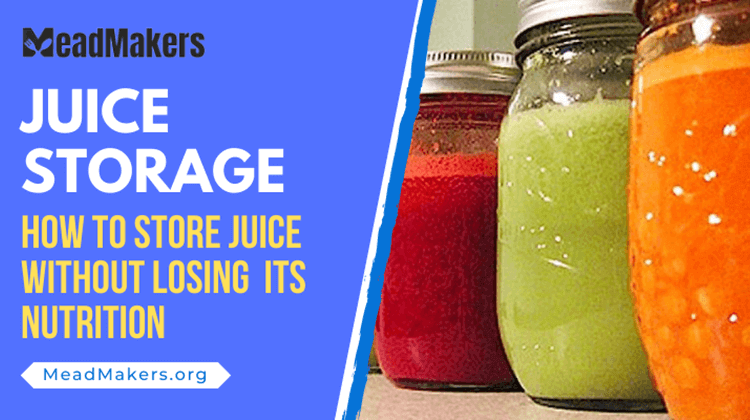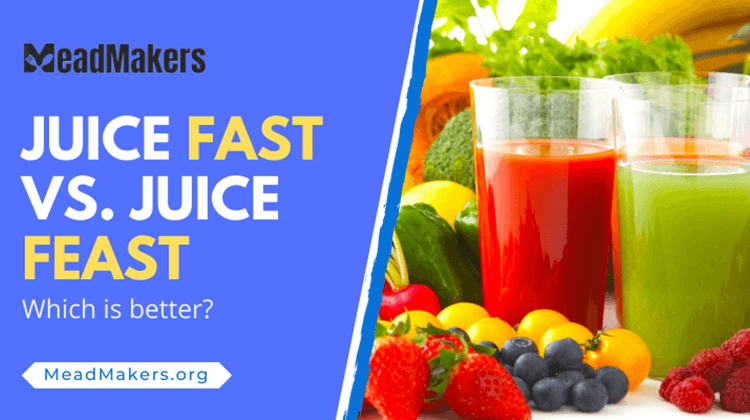Juice Storage: How to Store Juice after Juicing Without Losing Nutrients
This article is about juice storage, where you can learn how to store juice after juicing for maximum nutrient retention.
Juicing is a quick and easy way to get our daily doses of vegetables and fruits, which we’ve discovered in our quest to live healthier lifestyles.
Drinking freshly extracted juice immediately soon is the easiest method to get the most out of it.
Many people, unfortunately, do not have the time to make their own juice on a daily basis.
If you need to store your juice, knowing how to store your juice without losing its nutrition is essential for keeping it fresh.
Things to Consider for Juice Storage
Before going to store your fresh juice after juicing, consider the following things to preserve the maximum nutrition.
Type of Juicer
Juice has a different shelf life depending on the type of juice extractor utilized. The juice from a fast juicer, also known as a centrifugal juicer, usually lasts for 24 hours. Cold press juicers, on the other hand, have a 72-hour shelf life (including masticating and dual gear juicers).
Higher RPM juice extractors introduce a lot more oxygen into the juice, oxidizing it and destroying key minerals and vitamins. Centrifugal juicers are ineffective for storing juice for later use.
Juice Storage Container
The ideal juice containers are non-plastic, sealed containers. Plastic containers aren’t completely sealed and are full of chemicals that are harmful to your health (more of this later).
Go Organic
Synthetic insecticides, petroleum-based fertilizers, genetically modified organisms (GMOs), and sewage sludge-based fertilizers are not used in organic farming.
Chemicals are used less frequently than in traditional farming. As a result, you get nutrient-dense juice with very little exposure to chemicals.
Even if the FDA allows pesticides and fertilizers used in organic farming, you must still wash and peel your produce to eliminate any chemical residue. If there are fewer chemicals in your juice, it will last longer.
Keep Your Fruit and Vegetables Cold
You may get extra juice out of your vegetables by refrigerating them and then juicing them later. It will keep it at a temperature that prevents the growth of bacteria.
Get Ready
Before you begin juicing, be sure you have everything you need. Calculate how much juice you’ll need in three days, as that’s the maximum amount of time you can store it. This will keep commodities from being overproduced.
Remove Pulp
Once you’ve finished juicing, pour the juice into a glass container as close to the top as feasible. To keep the remaining cellulose in the juice from browning, strain out the pulp.
Filling and Sealing
It’s easy to fill (and clean!) a wide-mouthed jar. Fill the jar all the way to the top. The goal is to squeeze out as much air as possible by leaving as little space between the juice and the jar’s lid as feasible.
Before putting the jar in the refrigerator, double-check that the lid is securely fastened.
Storage and Labeling
On the label, write the contents of the jar as well as the date it was manufactured. This can be used to make a wide range of mixes.
If you’re using a centrifugal juicer, keep it in the store for no more than 24 hours; if you’re using a masticating juicer, keep it in the store for no more than 72 hours.
Naturally, consuming your juice before the estimated expiration date will allow you to absorb more nutrients and taste more powerful flavors.
Never Freeze Your Juice
Simply keep your juice chilled to increase its shelf life. I don’t recommend freezing your juice because it will change the flavor.
If you don’t have an option, make sure there’s enough room for the juice to expand. Don’t fill it to the brim. Do you really want to deal with a shattered window in your freezer?
Signs of Degradation
When storing your juice, keep an eye out for a change in color as well as a change in flavor.
Juice a lemon with your vegetables to aid in the preservation of your juice using the citric acid found naturally in lemons to aid in the preservation of your juice.
To minimize deterioration, drink your juice as soon as possible.
How Long Can You Store Your Juice?
If you follow all of the above guidelines, the vitamins, minerals, and nutrients in your juice will keep intact for up to 3 days or 72 hours.
The idea is to stay out of touch with air or sunlight. When exposed to air or oxidation, vitamins A, E, and C deteriorate; sunlight depletes these vitamins, as well as vitamin K, B-6, and B-12.
Heat isn’t an issue; unless you’re juicing a tomato that explodes, juicing rarely reaches boiling temperatures.
The same reason explains why centrifugal juicer juice only lasts 22 hours. The issue isn’t the explosion but rather the amount of oxidation that occurs in a juicing chamber with a fast-rotating blade assembly.
There’s no way to protect your juice from going bad if you use a centrifugal juicer; even refrigerating it won’t help. If you freeze it, it will work, but the juice will not taste as good.
The best way to enjoy juice from a centrifugal juicer is to drink it as soon as possible.
Juice Storage Options
See below the options for juice storage:
Mason Jars
By far, the best containers to use are glass containers, such as mason jars.
It’s practical; you can change your mason jar into a cup by adding a separate cap with a straw lid or a wide mouth jar cover. It’s really easy to use and maintain.
Check mason jar available on Amazon.
Hermetic Seals Jars
Hermetic jars are yet another excellent storage option. Hermetic jars are typically used to store herbs, spices, and other goods in the kitchen, but they can also be used to store juice.
It’s airtight and available in a range of sizes, from 7 ounces to 5 liters. However, I’m convinced that you won’t need such a large container.
You may buy a hermetic jar on Amazon.
Glass Bottles
Glass bottles are great for transporting without causing worry to others.
Some versions include a carrying loop for increased convenience and safety. However, due to the depth of these containers, you may want to invest in a bottle brush for cleaning. If you already have one, consider yourself lucky.
You can find your glass bottle on Amazon.
Glass Pitchers
If you’re concerned about your health, the best way to entertain your guests is to provide them with a healthy lunch, which would, of course, be perfectly matched by a glass of juice.
For large amounts of juice, glass pitchers are great. A glass pitcher with a capacity of one liter or two liters is available.
Buy your glass pitcher on Amazon.
Stainless Steel Tumblers and Jugs
This type of container keeps the juice cool while protecting it from the elements.
It will not readily break and will fit comfortably in your cup holder. This is by far the best container for carrying your juice to work, during a workout, when driving, or anywhere else.
Get your stainless steel jug on Amazon.
Why Not Use Plastic Containers Instead?
Though plastic containers are less prone to shatter, are lighter, and are less expensive than glass containers, the chemicals, and pollution that may leech into your juice outweigh these advantages.
Juicing is meant to be a healthy habit, not one that makes you ill. It defeats the purpose of juicing entirely.
Furthermore, because plastic containers are not totally sealed, your juice will oxidize faster.
Plastic contains bisphenol A (BPA), phthalates, polyvinyl chloride, and a plethora of other toxins. Because it is BPA-free, it isn’t any safer.
Even BPA alternatives used in BPA-free objects, according to the study, pose a health risk. In certain people, all of these substances have the potential to cause diseases, including cancer.
So, let’s avoid using plastic in our juice containers just to be cautious.
Related: Is Your Juicer BPA-Free? How Does It Matter? Let’s Explore
Conclusion
Your juice will last three days if you use a cold press juicer; follow the instructions above and store it in a non-plastic container. If you don’t have access to a cold press juicer, drink your juice right away to get the most out of it.
Suppose you observe discoloration, an unusual odor, or an unusual taste. It should be discarded for obvious reasons.
Which juice bottle is your go-to? Is there a container you’re using that I’m not aware of? Please leave a remark below if you have any questions or suggestions.
Recommended Posts:
Juicing for Diabetes: Is It Safe? Let’s Find Out
Juicing for Kids: Tips, Guidelines, and Recipes
Juicing During Pregnancy: The Most Comprehensive Guide






